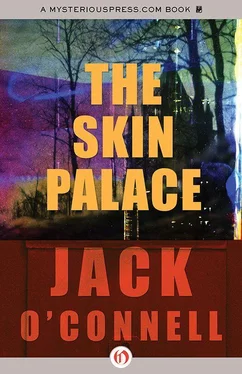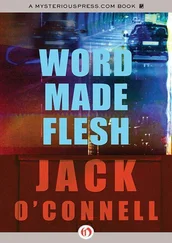Sylvia lays her head against his shoulder and stares out across the street. The sirens are closer and louder now. She scans the storefronts through tears. She doesn’t even try to focus.
But she can still see the sign where everything began:
Jack Deny’s Camera Exchange.
So she closes her eyes and holds on to this stranger.
They go back underneath the Canal Zone, under the safe cover of concrete and asphalt and red-brick arcs. They end up sitting at the counter of St. Benedict’s Diner, killing a bottle of something called MD 20/20, neither of them saying anything, not looking at each other, just working on the sweet wine, pulling it down their throats with a lazy persistence, as if this was the only job left in the world.
The last thing Sylvia remembers is wondering, if she sold everything she owns — the Aquinas and the other cameras and all the darkroom equipment — would she have enough cash for a down payment on the Ballard Theatre? She could take the place over from the Loftus Brothers, reopen it as The Pink Cage and show an endless succesion of women’s prison movies. Caged Women. Caged Fury. Caged Heat. Maybe even Born Innocent.
And then sometime later, Sylvia ends up asleep, lying sideways in one of the booths, her knees pulled up to her stomach, crouched in, fetal, as if once again she was back on her mother’s zombie-couch, living in Rita Hayworth’s black-and-white world, sinking into a kind of timeless dreamscape where all five senses are perpetually numbed.
When she wakes, her head is pounding and her knee is inflamed and burning and Propp is gone. There’s a note written directly onto the Formica tabletop in red marker.
Gompers Station
The Madonna’s Chamber
Midnight.
She sits for a second in the booth and stares at the words. She’s so tired of messages. She’s so tired of decoding and translating symbols and images. This means this. This does not mean something else. She licks the heel of her hand and feels how gritty it is. Like sandpaper. Like the tongue of a cat. She rubs at the tabletop, but instead of wiping the words away, she simply smears mem into a red mess, the letters still readable but bleeding into jagged angles and runny lines.
She leaves the diner and walks the railroad tunnels away from Gompers. After maybe an hour, she locates a rickety stairway that leads up into some anonymous Canal Zone basement, finds an exit and emerges into a freight alley off Rudolphe Road.
At the mouth of the alley, Mojo Bettman, the legless newspaper vendor, is perched on his fat skateboard with his back to her. She walks past him, then turns to see he’s selling the latest edition of the Spy.
Spread out on the sidewalk in front of Bettman, fanned like enormous playing cards, Sylvia sees copy after copy of the same photo of Paige Beatty being hauled into a police car, trying to resist, her hands shackled behind her, a riot-helmeted cop forcing her headfirst into the rear of his cruiser.
Bettman rocks slightly on his stumps, holds a folded paper out toward her, says, “Fanatics Bomb Local Porn Hall,” in this old-fashioned, newsboy chant.
She stares at him, then moves down Rudolphe.
Back at the apartment, she finds the kitchen door wide open and the gruff and sloppy noise of drunken men seeping out at her. She walks to the edge of the living room, stands hidden behind the doorjamb and looks around the corner. She sees a frat party that’s degenerated and turned the room into a grungy pigsty. She sees Mrs. Acker passed out on the couch, a cat asleep and wrapped around her throat like a thick, woolly scarf. She sees Eddie Meade and Garland Boetell sitting on the floor, side by side, their backs propped against the couch, both of them wildly disheveled and pathetically soused, each with a bottle of Scotch in one hand and listlessly fighting with their other hand for control of the television remote. Sylvia turns her head so she can see the screen. She expects to find pictures of Herzog’s in flames. Instead, she sees Perry and herself at the Cansino Drive-in, frozen in mid-copulation by the pause button.
“Hey, Perry -boy,” Meade barks, sounding a little like the Reverend, “Don’t you worry now. I’ll get you a real job downtown …” and his words degenerate into a rolling, phlegmy cough.
Sylvia finds Perry on the floor, head under the coffee table, unconscious.
She goes into the bedroom. There isn’t much she wants to keep. She gets a duffel from the closet and crams it with jeans and sweaters and she leaves without any notice.
Down in the darkroom, she unclips the seven prints from the dryline, shuffles them into an ordered pile, sits on the step stool, holds them in her lap. She puts her thumb on the lower right corner of the pile, holds the stack tightly with her left hand at the left margin. Then she riffles the prints. As if she can animate the photographs. As if the Madonna will get up off her perch, walk forward until she’s a full-faced close-up, and tell Sylvia what to do.
She finds a manila envelope under a pile on the work table, puts the prints inside and seals it, then puts the envelope inside the duffel and pulls the zipper closed, She turns off the darkroom light and starts to move out of the cellar, stops and walks to the Peg-Board where the electrical wiring for the house is mounted. She locates the main circuit breaker for the whole of the building and throws it to off.
Sylvia spends the rest of the day and night moving from theatre to theatre until she’s seen every movie currently in release. Over and over, in the brilliance of Technicolor and Panavision, she sees men and women come together and break apart, as if this was as inviolable a fact of nature as photosynthesis or the survival of the fittest. In between, a lot of guns go off and cars chase each other and inevitably crash.
She drinks so much cola and uses so many movie-house rest rooms that by the time she watches her final credits scroll up toward the ceiling, she thinks she’s come close to damaging her bladder.
And by midnight, she’s back at Gompers Station.
She finds her way into what she’s now naturally, instinctively, thinking of as The Madonna’s Chamber. On the marble column stump, a figure is posed with something in its arm and her breath goes shallow and her heart belts against the inside of her chest.
But then the figure turns and some light plays down on the face and she sees that it’s just Propp and what he’s cradling is only his Diane Arbus rucksack. He stands and comes to her, his arm fishing inside his bag as he walks.
“I’ve got something for you,” he says. He pulls out a stack of snapshots and hands them to her.
“Like an old spy movie,” Sylvia says. “Two people meeting in the shadows.”
“In a train station, no less.”
“Exchanging information.”
“You’ve watched,” he says, “too many Peter Lorre movies.”
“No question,” she says, then takes her manila envelope from the duffel and hands it to him. “I’ve watched too many movies altogether.”
He doesn’t say anything. He doesn’t even look at the envelope, just crams the package into his bag, He takes her arm and points to the remains of the main stairway that are now just a slanted incline of rubble.
“Did you see the news?” he asks.
She shakes her head no.
“They found what was left of Schick and his company—”
“I really don’t want to hear it—”
“A lot of conflicting reports, but the main take is that the woman—”
“Paige.”
“Yes, Paige, she’ll likely be charged.”
“She didn’t do it …” Sylvia starts to say and lets it go.
Читать дальше











